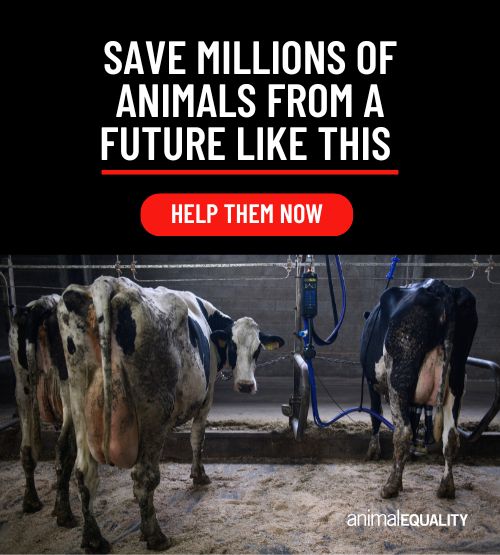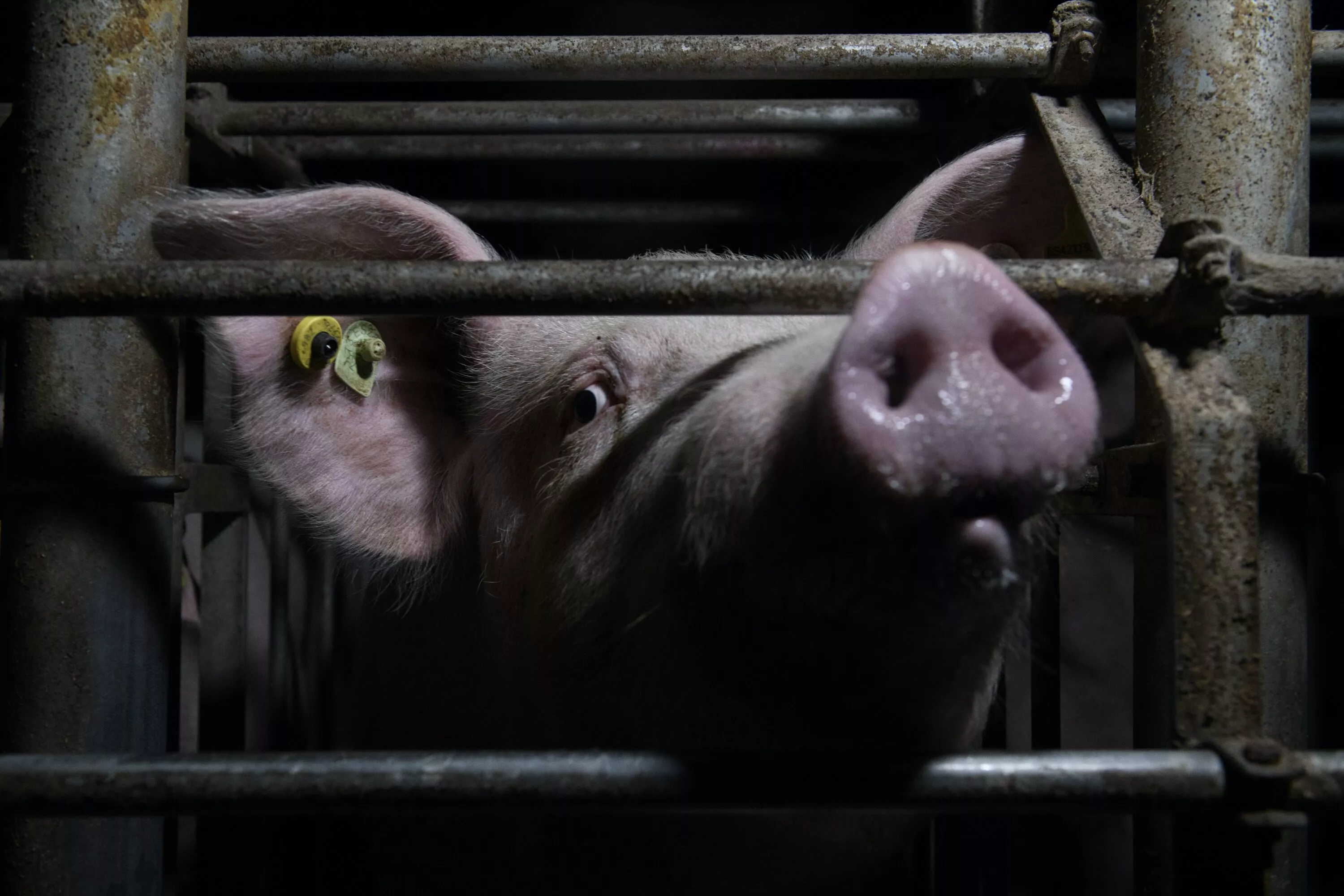
Top restaurant chains are profiting from animal abuse. You can stop them.
Animal Equality is calling out restaurants involved in one of the worst factory farming practices: locking pregnant pigs in gestation crates—cages so small that they can’t even turn around.
Since 2008, several US restaurant chains have pledged to stop using gestation crates for pregnant pigs. Eleven states and several countries have already made this practice illegal. Companies like McDonald’s, Burger King, and Chipotle have made progress, while others lag behind. This report calls out those without commitments to eliminate gestation crates, and calls on them to ban this extreme animal cruelty in their supply chains.
Demand better from these restaurant chains!

DUNKIN’
In 2012, Dunkin’ pledged to eliminate gestation crates from its supply chain. It updated its policy in 2015 and again in 2017, both times reaffirming its commitment to reach its goal by 2022. They also stated that it would publish interim reports on its progress by end of 2018 and 2020, but no reports were published. Inspire Brands acquired Dunkin’ Brands in December 2020 for $11.3 billion. The company no longer maintains a public commitment to eliminate gestation crates.

PAPA JOHNS
Papa Johns pledged to eliminate gestation crates from its supply chain in 2013. However, the company has backtracked and removed its policy. While the company currently claims that it “continue[s] working with our suppliers to identify—and encourage the creation of—more sources of pork raised in alternative housing options,” it has reported no meaningful progress.

SONIC
In 2010, Sonic committed to phasing out gestation crates from its supply chain. The company claimed that it was working toward a crate-free supply chain by 2017, and no later than 2022. Inspire Brands acquired Sonic, and took it private, in a $2.3 billion acquisition in 2018. The company no longer has any public commitment to eliminate gestation crates from its supply chain.

TACO BELL
Taco Bell, owned by Yum! Brands, has no public plan to eliminate gestation crates. However, the company has claimed that it will publish a policy on or around September 30, 2024. The company also states that it will establish benchmarks for moving to group housing and will report publicly on its findings.
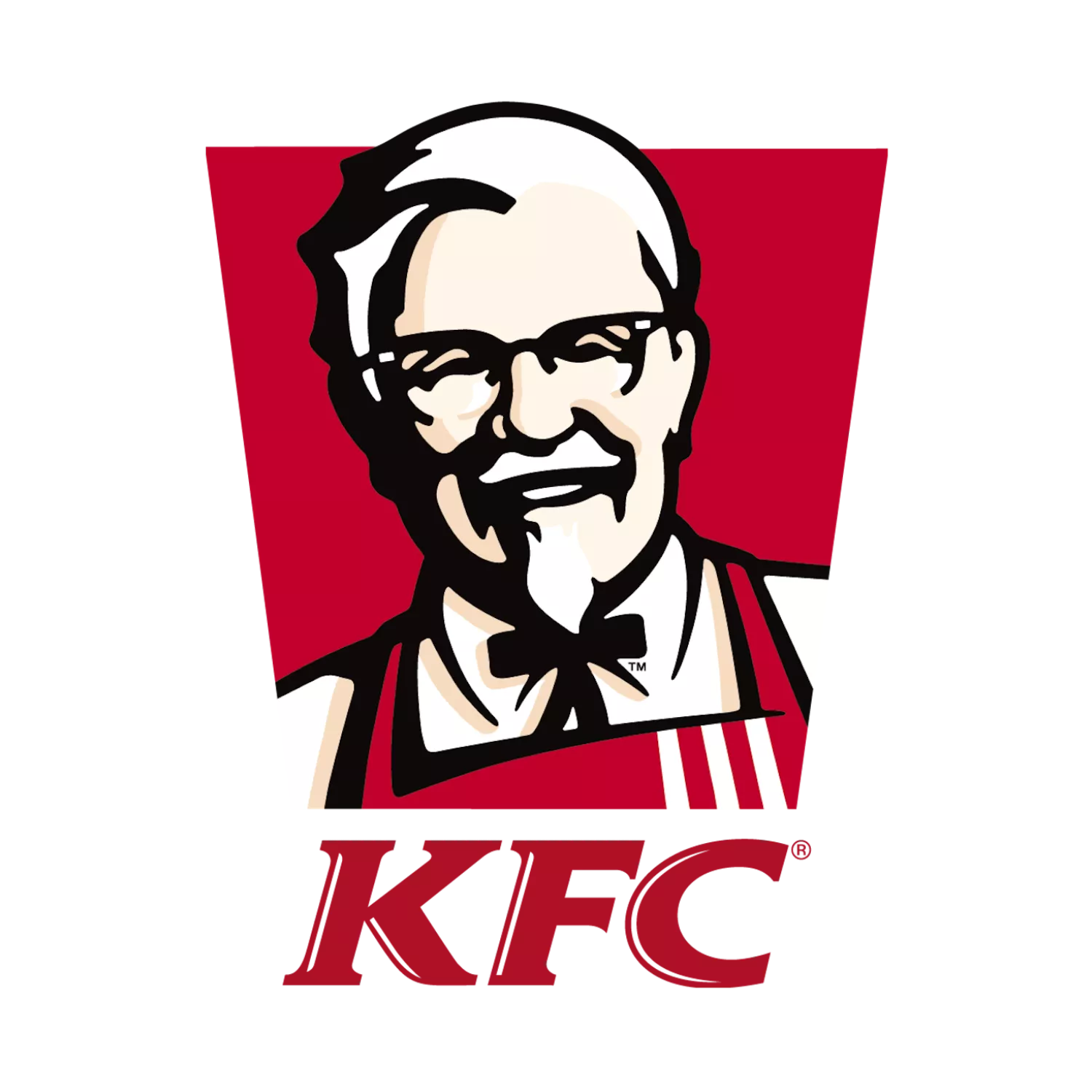
KFC
KFC, owned by Yum! Brands, has no public plan to eliminate gestation crates. However, the company has claimed that it will publish a policy on or around September 30, 2024. The company also states that it will establish benchmarks for moving to group housing and will report publicly on its findings.

SUBWAY
Subway pledged to eliminate gestation crates in 2012. However, Subway no longer maintains this commitment and has removed language about gestation crates in its U.S. operations entirely. This contradicts Subway’s own claims that “close confinement” remains a “key issue” in the company’s supply chain.

QDOBA
Qdoba made its initial commitment to eliminate gestation crates from its supply chain in 2012. However, the company has backtracked and removed its policy entirely.

RED ROBIN
Red Robin made its initial commitment to eliminate gestation crates from its supply chain in 2009. However, the company has backtracked and removed its policy entirely.
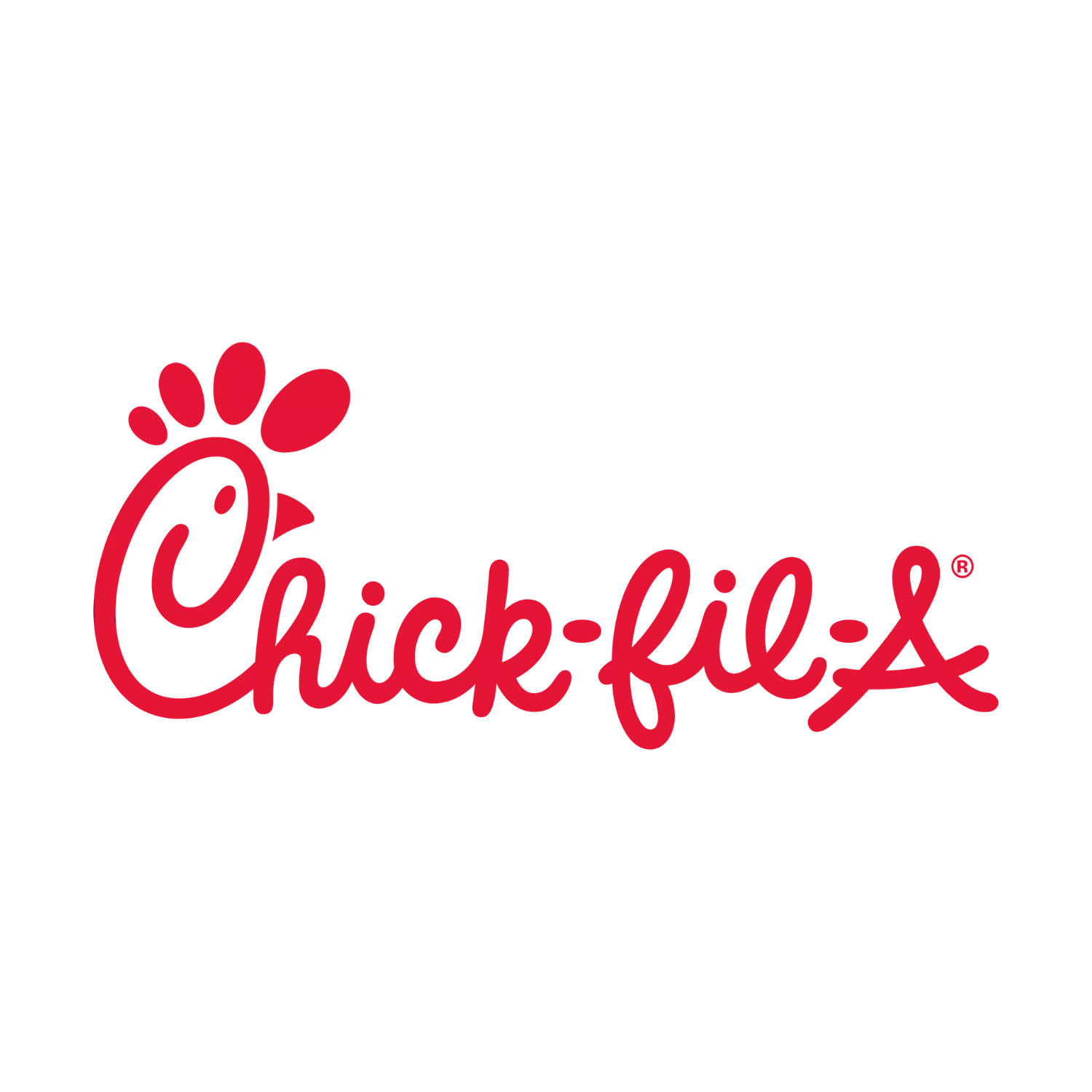
CHICK-FIL-A
Chick-Fil-A has no public commitment to eliminate gestation crates from its supply chain.

TEXAS ROADHOUSE
Texas Roadhouse has no public commitment to eliminate gestation crates from its supply chain.

BJ’S RESTAURANTS
BJ’s Restaurants has no public commitment to eliminate gestation crates from its supply chain.
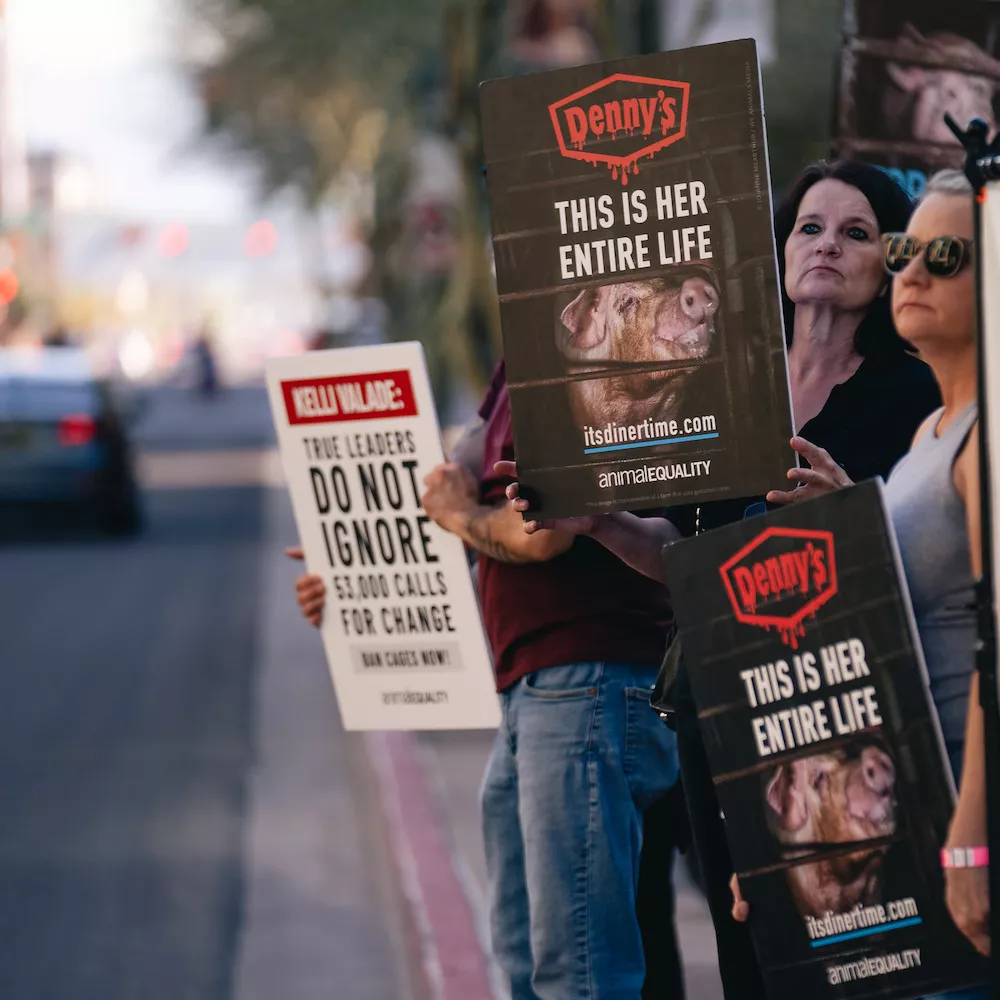

In 2012, Denny’s committed to eliminating gestation crates from its supply chain. However, in 2023, the company backtracked and eliminated its commitment entirely. As of April 2024, the company still lacks a public commitment to fully eliminate gestation crates from its supply chain.
For more than a year, animal advocates and consumers have sent tens of thousands of messages to Denny’s leadership regarding their broken promise.
Discover the full report
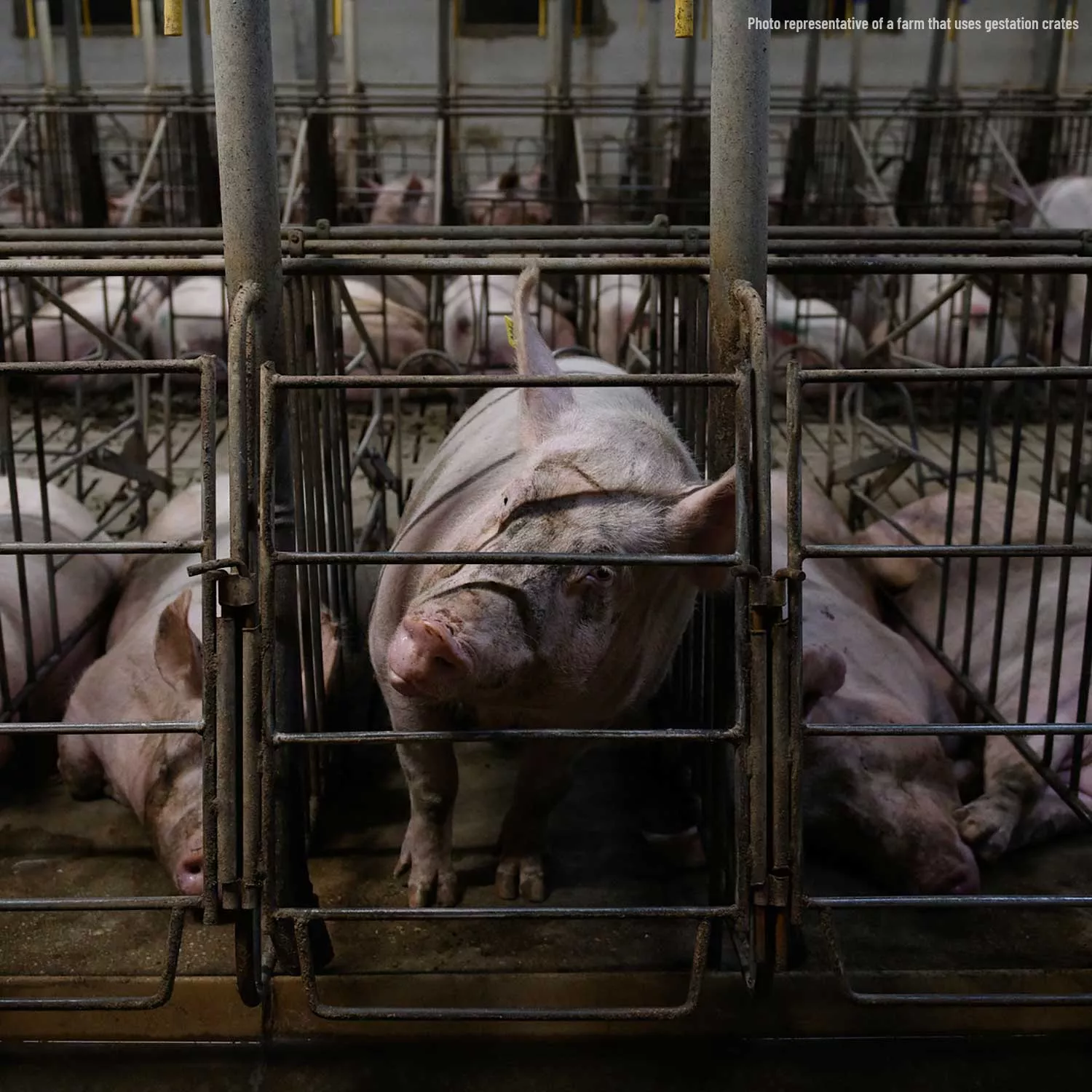
What is a gestation crate?
A gestation crate is a metal pen in which pregnant pigs are kept for part or all of their pregnancies. Shortly after a pig is impregnated, the pig is moved to a gestation crate. These crates are only slightly larger than her body, measuring around 2 feet (1.6m) wide by 7 feet (2.1m) long. In these crates, a mother pig can take only a single step forward or backward and cannot fully extend her limbs. The floor beneath her is slatted, allowing excrement and urine to fall into a pit below.
EXPERTS AGREE: GESTATION CRATES MUST GO

Gestation crates for pigs are a real problem…Basically, you’re asking a sow to live in an airline seat…I think it’s something that needs to be phased out.
Temple Grandin
Associate Professor, Department of Animal Science, Colorado State University

…[T]he close confinement of sows in stalls or tethers is one of the most extreme examples of cruelty to an animal. It continues throughout much of life and is much worse than severely beating an animal or most laboratory experiments.
Donald M. Broom
Professor of Animal Welfare, University of Cambridge

Confinement of sows during pregnancy, especially in individual stalls or on tethers, can be cold, uncomfortable, and injurious, and imposes severe restrictions on natural behavior.
John Webster
Senior Research Fellow and Emeritus Professor of Animal Husbandry, University of Bristol, Creator of the Five Freedoms
Negative Effects of Gestation Crates
Movement is restricted
Gestation crates are so small that a sow cannot turn around, which leads to decreased cardiovascular fitness. This restriction decreases both muscle strength and bone density, which worsens with each pregnancy. Group-housed pigs, who are slightly less restricted, show fewer abnormalities in their bone and muscle development. Crated pigs also experience more confinement-related injuries, such as pressure sores, ulcers, and abrasions. They have higher rates of calluses and limb injuries.
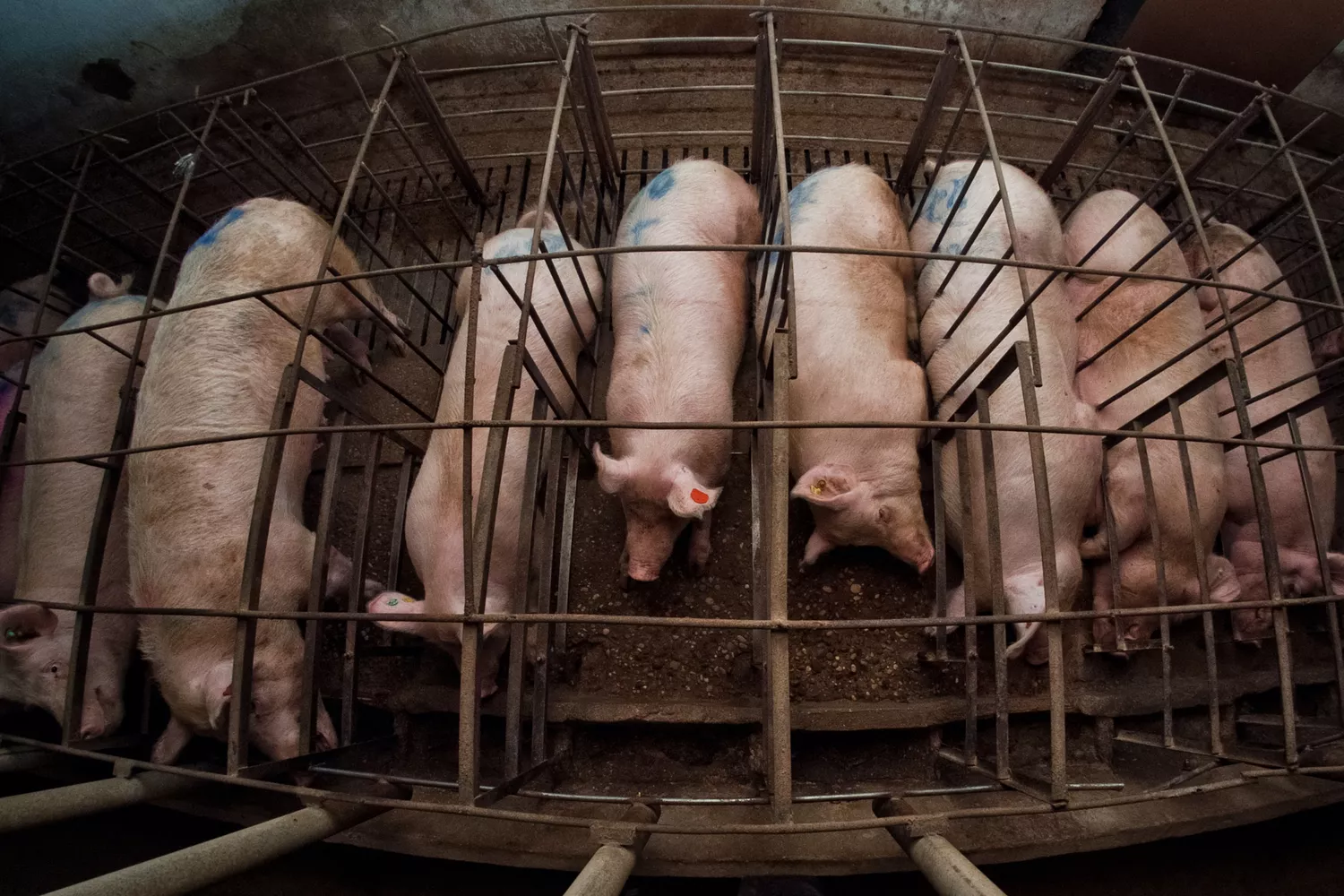
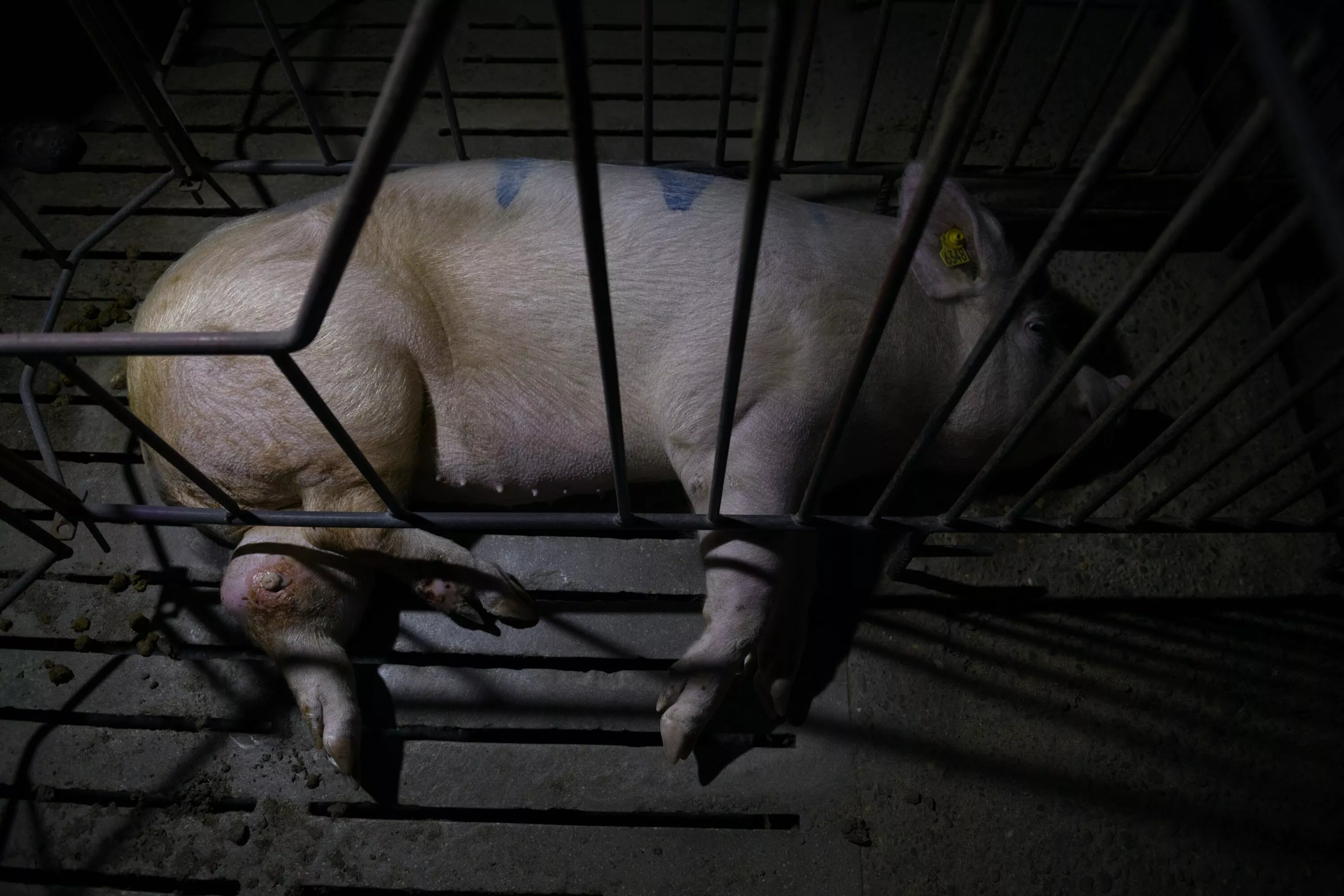
Injury is common
Gestation crates sit atop hard, slatted flooring, which causes foot lesions in as many as 80% of crated sows. The crate itself can also rub against the pig’s skin, causing lesions and sores. These injuries worsen as her pregnant body grows. The concrete floor causes sustained pressure on her limbs, leading to bursitis, the painful inflammation of fluid-filled sacs that provide cushion near joints. Pigs in gestation crates also suffer from a higher rate of urinary tract infections than uncrated pigs.
In natural settings, pigs choose to defecate away from their resting areas. In gestation crates, however, they must urinate and defecate in their living spaces.
undeniable stress
Crated pigs also experience higher stress levels, as shown by ACTH, A, and COR in their blood. This leads to more frequent stereotypic behaviors or repetitive behaviors that include “sham-chewing” (chewing at the air) and biting the gestation crate’s bars. Restricted movement and food intake also increases these stress behaviors. Research has also shown that pigs experience less stress in group-housed environments.
The chronic stress of confinement can also extend to piglets’ health. The stress of confinement can cause compromised immune responses in piglets born to crated mothers.
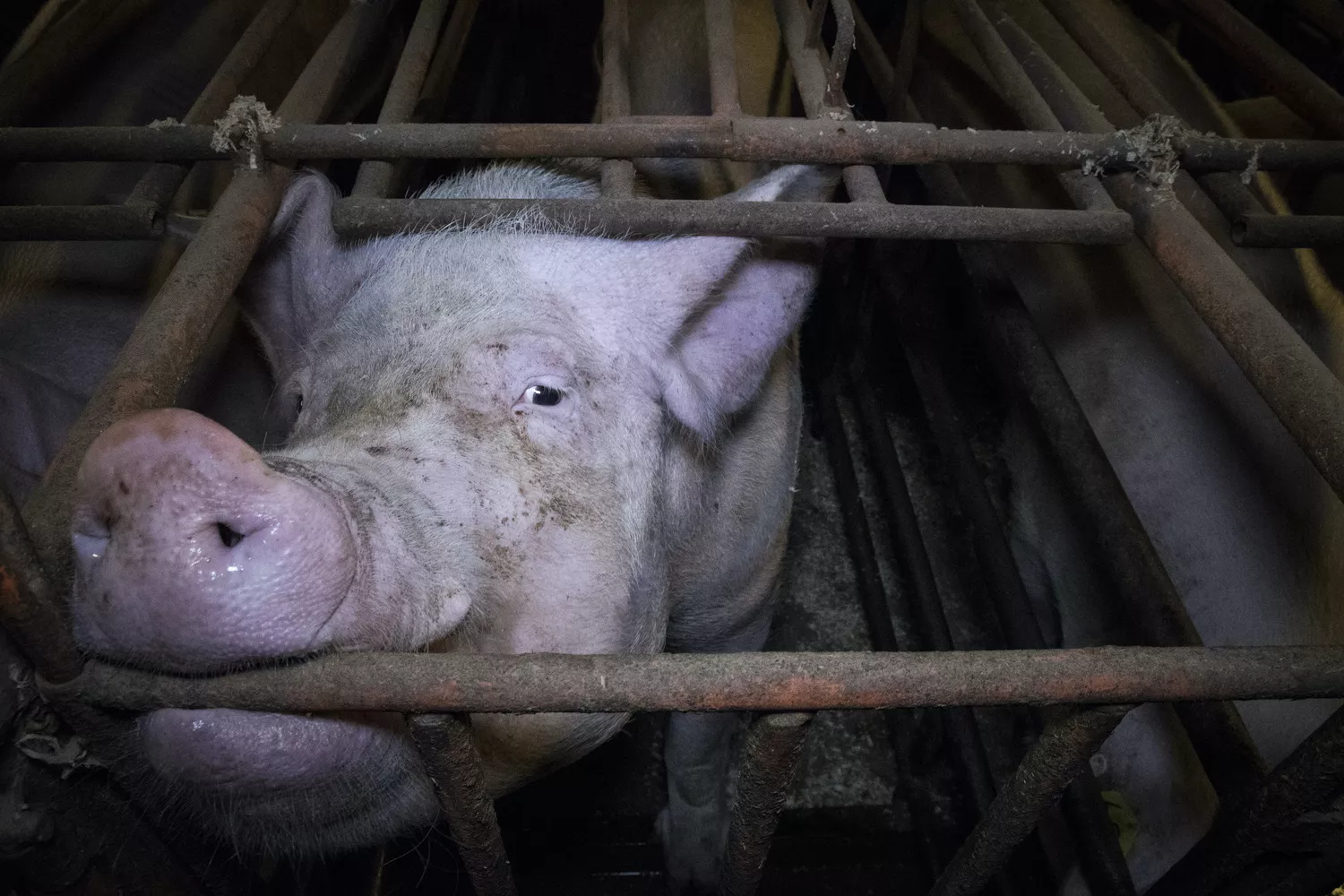
This information is based on public statements previously made by these companies. We cannot guarantee the accuracy of these statements or whether these are up-to-date policy statements. All images on this website are representative of farms that use gestation crates and do not necessarily come from farms that supply these restaurant chains.
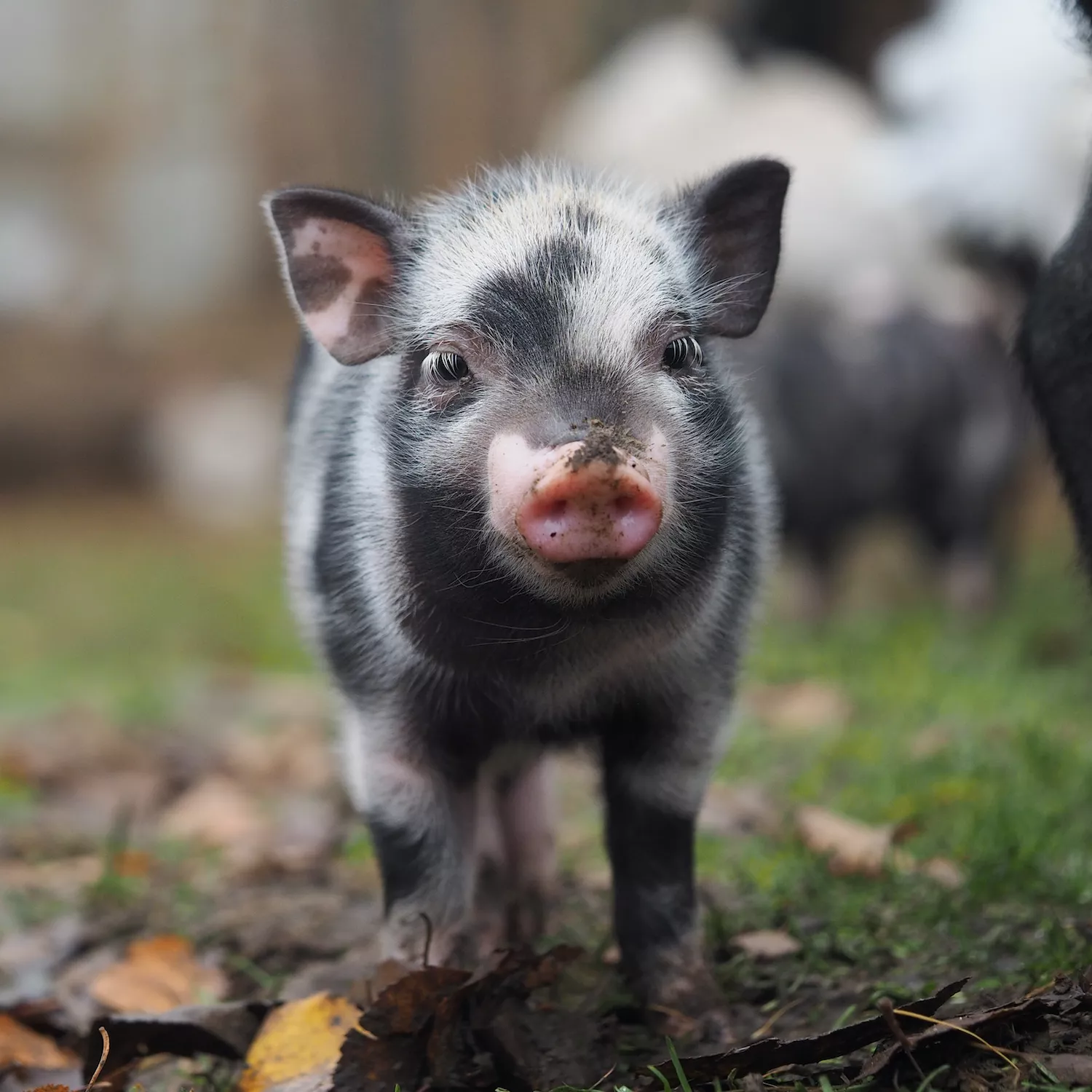
Protect animals with every meal
Discover Love Veg
By eating delicious plant-based foods, you help spare animals from suffering on factory farms. In fact, by eating plant-based, you can save up to 300 animals every year!


